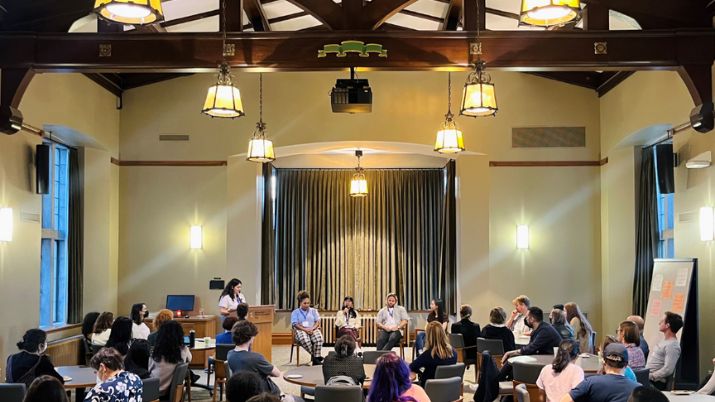

CENES Alumni Night, 2022.
Meet Minori Kato-Hopkins, a BA’19 Scandinavian Minor & MA’23, and currently an Instructional Designer in the Office of Faculty Development, UBC Faculty of Medicine.
Originally from Japan, Minori completed her BA in English Language and Literature (with a minor in Scandinavian Studies) in 2019, and holds a MA in Children’s Literature from the UBC School of Information. As a researcher of New Media and an Open Education enthusiast, Minori is passionate about highlighting interactive and accessible storytelling and how they can enhance educational materials.


As a student, if you have ever wondered why you should major or minor in a CENES program, what skills you get our of the Department’s courses, or what career opportunities are possible post-UBC, read through some of Minori’s answers from our 2025 Careers panel.
CENES: What motivated you to choose your degree? How have you found it to be relevant in your work today, your broader industry, or the world as you experience it?
Minori: I’ll be honest, what motivated me was, well, fun! I had already chosen my major, and was looking to fill my class schedule with classes that genuinely interested me, and soon enough it just made sense to have a Scandinavian Studies minor. While I don’t use my Swedish at work, the classes that I took from the CENES department are some of my most memorable, and I still share tidbits about Sagas and witches and cinema, so I would say it’s been my most useful in conversations!
CENES: What was your trajectory from CENES to where you are now?
Minori: After my CENES degree I completed my Master’s degree. During my master’s, I headed conference and event committees and worked several jobs supporting the library and its various partnering units. My strong references, hard numbers, and portfolio of projects from those student experiences landed me my current role!
CENES: Some of us have heard the sentiment that Arts degrees are “less valuable” or “career-oriented” than others. How would you respond to that? What value have you found in doing CENES programs?
Minori: I think that Arts degrees require context more than other degrees, but that’s the only major difference. But Arts degrees equip you with the skills to reflect on events, see patterns, and identify connections – you just have to do that for others to show your degree’s worth. For example, I really specialized into storytelling and narratives for my degrees, and I think what’s interesting is that most communication is a form of storytelling – and now, creating teaching materials, I find that I’ve acquired an eye for keeping things flowing, even when they’re complex.
CENES: How has the department supported you to pursue your goals, whether that be professional, academic, or more personal? Are there scholarships, research opportunities, connections, etc. that you found particularly useful?
Minori: I found that being involved with the SNCA (UBC Scandinavian and Nordic Student Association) and the CENES faculty really connected me to an on-campus community that felt like home, so that was the greatest benefit. At the same time, I remember that I leveraged the work I was doing at the SNCA and other student organizations to apply and receive a student leadership award through the AMS and in turn used that award application experience later to fund student events through grants.
CENES: CENES programs have a language requirement. What was your experience taking languages with CENES, and how have you found it useful later in life?
Minori: I adored my Swedish classes, and the welcoming atmosphere was very healing for me, since I hadn’t quite found a good community on campus. Having a cohort of students that I saw every week for 2 years was really nice. I’m sad to say I haven’t used my Swedish much since, but at the time, I was really fascinated by the grammatical overlap between my classes on Old English and Swedish – so I felt that both classes benefitted from me being in both.
CENES: CENES also has a big focus on literature courses. What skills have you gained from this and how have you applied them to your career or education?
Minori: My literature courses set me up to be very quick at organizing and identifying information that’s relevant to what I’m doing, which helps me when I do research now. They also made me familiar and comfortable with learning about something I had no prior knowledge in – say, Russian literature – and exercise wrapping my head around a completely new concept within a semester. Now that I work in medicine, a field I have no prior background in, I’m very grateful for the adaptability that I practiced during my degree.
CENES: Are there any other specific CENES courses or experiences that stood out to you?
Minori: I adored the folklore-related courses, since I got to learn more about where modern fantasy has taken inspiration from!
CENES: What skills or experiences can students who are interested in pursuing a career in your field start developing now?
Minori: Simple graphic design and website management is a great place to start, and you can learn those on your own, or as part of a course or job. Nobody wants to scroll through a wall of text on a website, and everyone’s eyes glaze over when you see a word-heavy poster or slide. A little bit of practice and looking at examples, and you will come to identify what information is truly important, and how you can organize it to draw the viewer’s attention.
CENES: Can you describe a typical workday for us?
Minori: Sure! In a typical workday, I’ll be working on a suite of projects that run concurrently, and handle the organization, creation, and dissemination tasks. So I might start the morning by checking if any urgent asks have come in, and if not, I’ll continue working on an infographic or document that the faculty members have asked for. Most days I have about 2 or 3 meetings, so I’ll prepare for those ahead of time as well. For example, today I led a meeting with about 10 faculty members, where I presented my prototypes for posters, webpages, and documents, and gave everyone directions for how they can give me feedback. Some projects are more graphic-design heavy, and others are more research-heavy; I prefer the artsy ones, because I get to be creative!
CENES: How can students/graduates pitch or frame their Arts degrees as being relevant for the work/roles in this field?
Minori: With evidence and reframing! Having some concrete experiences, paid or unpaid, to highlight the practical applications of your skills and studies is essential.
CENES: How do you think your Arts degree set you apart and propelled you forward in this field?
Minori: I think that my Arts degree has over all things, made me an all-rounder. Like I said, when you’re accustomed to wrapping your head around a subject quickly, you’re able to pick up themes and tools and apply them as you go. Which can really help you establish yourself as a dependable coworker.
CENES: Outside of the classroom, how did you gain relevant experience during your undergraduate degree?
Minori: I was heavily involved in student organizations and events, I highly recommend it! Looking into student conferences, club leadership positions are very good for making connections and hearing what others are thinking.
CENES: What advice do you have for current Arts students? Perhaps something you wish you’d heard as an undergrad?
Minori: That you don’t have to have it all figured out – and that everything is experience. Take this opportunity to try different jobs, classes, or even take breaks. Wherever you end up, your Arts degree will help you reframe and draw strengths from all your experiences!


